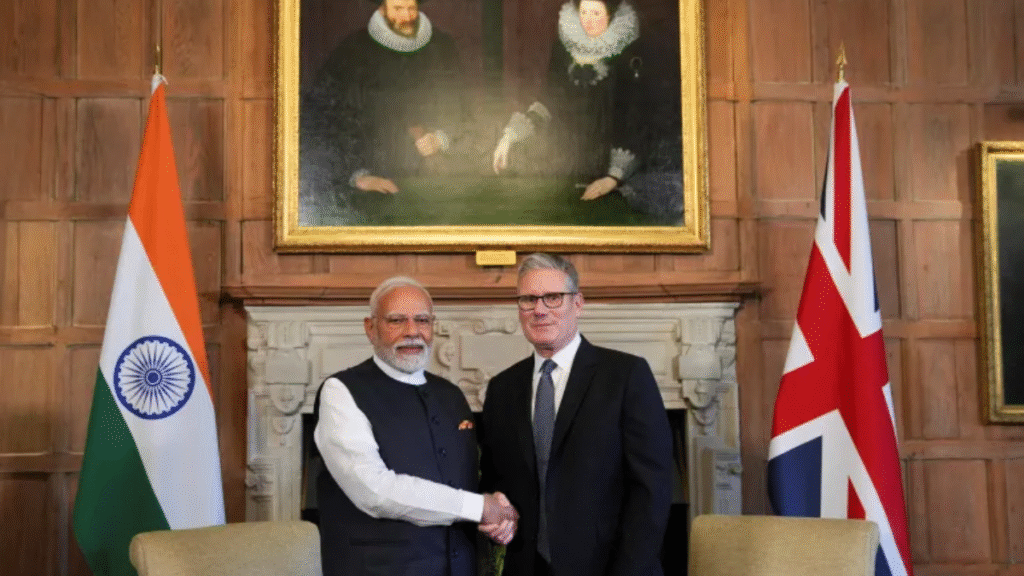Summary – The recent UK-India trade agreement marks a pivotal economic shift with significant implications for Europe’s trade and policy dynamics.,
Article –
The recent UK-India trade agreement, valued at $6.5 billion, marks a pivotal economic development with far-reaching implications for Europe’s trade and geopolitical landscape.
Background
The deal comes after the United Kingdom’s exit from the European Union, driving the need for new trade partnerships beyond Europe. Negotiations that began in 2022 have successfully reduced tariffs on a broad range of goods and tackled non-tariff barriers such as regulatory and market access challenges. This partnership not only symbolizes the UK’s strategic reorientation toward Asia but also supports India’s ‘Make in India’ initiative by boosting exports and attracting foreign investments.
Key Players
- United Kingdom: Led by Prime Minister Rishi Sunak and the Department for International Trade (DIT), with critical input from the UK Trade Secretary focusing on mutual benefits like job creation and innovation.
- India: Led by Prime Minister Narendra Modi and the Ministry of Commerce and Industry, aiming to increase market access for agricultural and industrial products.
- Business sectors including manufacturers and technology firms on both sides are key stakeholders in realizing the agreement’s potential.
European Impact
Though the UK now trades independently, this agreement affects Europe economically and politically:
- Economic: EU companies may face tougher competition in India due to lowered UK tariffs. Shifts in trade flows are expected as UK firms utilize enhanced Indian market access.
- Political: The EU might reassess its bilateral trade talks with India to maintain competitiveness in comparison to UK agreements.
Moreover, the deal exemplifies the UK’s shift from EU-centric trade relations to engaging with growing Asian markets, which could influence Europe’s economic integration efforts and external trade strategies. It may also serve as a blueprint for other nations establishing ties with fast-growing economies outside traditional EU frameworks.
Wider Reactions
The European Commission has responded with cautious interest, weighing the opportunities against the challenges for the single market. Some EU member states worry about potential disadvantages for their exporters. Economic analyses highlight that tariff cuts on sectors like chemicals, pharmaceuticals, and IT products might increase competition.
Regional neighbors and partners are closely watching the agreement’s potential effect on supply chains and investments. Experts view this as part of a broader trend toward more diversified global trade alliances. Meanwhile, business communities in both the UK and India generally welcome the deal for its potential to drive growth, innovation, and employment.
What Comes Next?
Successful implementation will depend on streamlined customs, regulatory cooperation, and business outreach. There is also an opportunity to expand the agreement to services and digital trade, critical sectors for both economies.
For Europe, important questions arise regarding the future of EU-India relations, the speed of Brussels’ trade negotiations, and strategies to safeguard European industries in a shifting competitive environment. Close monitoring of trade, investment, and supply chain trends will be key to understanding the evolving economic landscape.
In summary, the UK-India $6.5 billion trade deal is more than a bilateral agreement; it signifies a strategic shift with extensive consequences for Europe’s trade policies and economic standing. European policymakers and businesses must reassess their priorities amid a more multipolar global economic order.
As Europe adjusts to these new dynamics, the responses of the EU and emerging alliances will shape the future trade environment. Stay tuned to Questiqa Europe for ongoing regional insights.

More Stories
Why Europe Is Watching England’s Decision Against a Bank Holiday After Euro 2025 Victory
Why the UK Government Declined a Bank Holiday After the Lionesses’ Euro 2025 Triumph
How the India-UK Trade Deal Preserves Access to Affordable Medicines for Europe